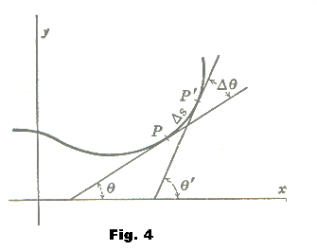
Let's assume that an object moves in an arbitrary curve which is described by y=y(x). We want to find the centripetal force that acts on the object in any point.
Well, we know that the centripetal force for an object moving in a circle is mυ^2/R, where R is the radius of the circle, m the mass and υ the velocity.
If we assume that any point of the arbitrary curve is also a point of hypothetical circle of radius R(x), then finding the function R(x) means that we can calculate the centripetal force (mυ^2/R(x)) at any point.
Let's take a small part of the curve with length dS. As a part of circle with radius R(x) it has a length of dS=R.dθ. As a part of the curve y(x) it has a length of sqrt(1+y'^2)dx, where y'=dy/dx. That is,
R. dθ=sqrt(1+y'^2)dx, or, R.θ' = sqrt(1+y'^2), where θ'=dθ/dx.
We know that tanθ=dy/dx=y'. Differentiating we get, θ' = cos^2(θ).y'' But we know that cos^2(θ)(1+y'2)=1.
So we finally get that: R(x) = (1+y'2)^(3/2) / y''.
Source of image: SolitaryRoad
Comments
Post a Comment